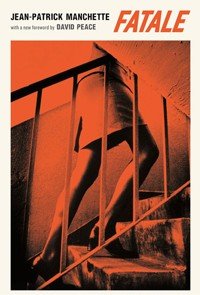
For readers who dislike consuming political lectures with their thrillers: fear not, there are no overt political statements in this slim book. It is a short, sharp and shocking read, full of action, violence and very graphic descriptions. Manchette used to joke that, whatever a work’s content might be, if you use ‘sex’ and ‘money’ in the blurb, it will sell. And he does not shy away from using both in this book. So much so, in fact, that it has just recently been turned into a successful graphic novel (image below) in its native France, illustrated by the very talented Max Cabanes.
This is the story of a femme fatale who changes hair colour, appearance, name, brand of cigarettes and backwater towns as easily as other people change socks. She appears in the deadly dull port town of Bléville as blonde widow Aimée Joubert and soon discovers a nest of small-minded hypocrisy, hidden scandals and seething resentment. This is the scenario she thrives on, stirring up animosity and offering her services as a killer. The death of the undeserving rich (she only goes to places where there is plenty of money) arouses her. We are never quite sure if the money she earns in the process is the ultimate goal and pleasure, or more of a pretext. This time, however, things do not quite go according to plan, because Aimée discovers something within herself that she did not believe she had: compassion. It is this compassion which turns her from a killing machine to a human being… and which ultimately proves to be her downfall.
Pared down to the bare essentials, Manchette’s style is very reminiscent of the American hardboiled novels which he spent his earlier years translating for French publishers. However, he has made this style his own, with a cool wit, sensuous images and sentences laden with symbolism. Is Aimée an avenging angel or a she-devil? The original title of the book was La belle dame sans merci, so a merciless killer is our first impression of her. We are never privy to her innermost thoughts – Manchette always describes his characters by their external actions.
But the startling final vision of Aimée reframes all our previous thoughts about her. You’ll be struck by the image of the wounded woman in a scarlet dress and high heels, clambering up a snow-covered slope, because, “…whichever way you go, there is big hill to climb before you get out of Bléville.” The final line then addresses itself to all sensual and philosophically-minded women (a reference to a line from Sade), but in upper-case, which reminds us of the political slogans of the 1968 generation. Is it Manchette’s belief that women will be the drivers of social change?
We shall never know, for Manchette liked to remain enigmatic in each of his very noir novels. This is probably his darkest, yet at the time of writing it he declared, ‘I am not quite negative enough.’
As fast-paced and lurid as pulp fiction, but with a masterful control of language, this is noir writing at its best. This new edition of Manchette’s work also contains a fascinating foreword by David Peace and an afterword by French novelist Jean Echenoz, which bring further insights to this small gem of French literature.
Read our recent review of The Mad and the Bad by Jean-Patrick Manchette here.
Serpent’s Tail
Print/Kindle/iBook
£3.00
CFL Rating: 5 Stars